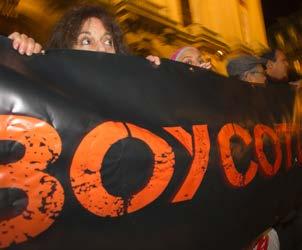
2 minute read
He signed the Taylor Force Act so US funds would not be used to pay terrorists to maim and murder Americans and Israelis
Iron Dome launcher
Boycott, Divestment, and Sanctions (BDS

) movement sign
So while credit must be given to President Obama for his leadership on the new MOU agreement, President Trump still gets full marks for ensuring this important agreement is carried out.
rPrinciple 3: Oppose the global
Boycott, Divestment, and Sanctions (BDS ) movement against Israel
On February 5, 2019, Senator Marco Rubio’s (RFL) bill, the Strengthening America’s Security in the Middle East Act (S.1), passed in the Senate by a vote of 77–23. Unfortunately, the Democratcontrolled House of Representatives refused to take up the bill due to a provision included called the Combatting BDS Act of 2019.
Rubio’s provision would have empowered states in their efforts to disengage from contracts with entities involved in boycotts of Israel. Some 27 states have already passed legislation against the BDS movement, and this would have provided some cover from counter lawsuits from organizations such as the ACLU.
The record of what followed in 2019 is truly distressing. By March, Congress was forced to respond to vile anti-Semitic tropes regurgitated by Rep. Ilhan Omar (D-MN), but in their confusion, all that resulted was a watered-down rebuke that condemned both anti-Semitism and Islamophobia. It’s worth noting that, according to the FBI, over 50 percent of all religiously motivated hate crimes in the United States are directed at Jews or Jewish institutions. There is no parallel.
In April, the Chabad of Poway synagogue in California was attacked on the last day of Passover by a deranged gunman who killed one and injured three, including the rabbi. This was less than six months after the deadliest antiSemitic attack to ever occur on US soil when the Tree of Life synagogue in Pittsburgh was attacked, killing eleven and wounding six.
By the end of the year, President Trump had grown frustrated with Congress’ lack of action in response to the growing problem of anti-Semitism. Recognizing the role college campuses play not only in fermenting antiSemitic ideas but also in real discrimination against Jewish students, President Trump signed an executive order against anti-Semitism on December 11, 2019. The order specifically protects Jews from discrimination at taxpayerfunded universities and recognizes antiZionism as being anti-Semitic. This is important because the BDS movement is built upon the insidious idea that Zionism is racist and the Jews have no right to live in Israel as their ancestral homeland.
While more could have done over the last four years to oppose the BDS movement in the United States, President Trump still gets full marks for taking as much initiative as he could to combat the problem at its source.
rPrinciple 4: Sanction Iran’s
relentless actions as the world’s leading sponsor of terror
On May 8, 2018, President Trump announced that the United States was withdrawing from the Joint Comprehensive Plan of Action (JCPA), or Iran Deal as it is better known. Trump called it “a horrible one-sided deal that should have never, ever been made.” He also promised to snap back US nuclear sanctions, which had been suspended under the Obama administration. By the end of the year, some 1,000 Iranian persons and entities had been targeted for sanctions. The sanctions were tagged in response to terrorism, human rights, WMD proliferation, and the Islamic Revolutionary Guard Corps (IRGC).







